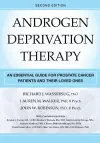
Androgen Deprivation Therapy
3 authors - Paperback
£21.99
Richard J. Wassersug, PhD, is a research scientist who earned his doctoral degree in evolutionary biology from the University of Chicago in Illinois. He then spent most of his career studying the biology of amphibians and teaching anatomy in the medical school at Dalhousie University in Halifax, Nova Scotia. At the age of 52 years, he was diagnosed with prostate cancer and has received multiple treatments for the disease. After beginning androgen deprivation therapy, he redirected his research to study the psychology of androgen deprivation in various populations. Wassersug now holds the title of Honorary Professor at the University of British Columbia, Vancouver, Canada.
Lauren M. Walker, PhD, R Psych, is an Adjunct Associate Professor in the Department of Oncology's Division of Psychosocial Oncology and the Department of Psychology at the University of Calgary in Alberta. She is a registered clinical psychologist in the province of Alberta and operates a private clinical psychology practice for individuals with sexual concerns (see www.drlaurenwalker.com). She completed a clinical fellowship in 2015 specializing in oncology and sexuality, where she focused on developing programs to help cancer patients adapt to sexual changes after cancer treatment. She received her doctorate in clinical psychology in 2013 from the University of Calgary. There she completed her dissertation, which evaluated a patient education initiative for prostate cancer patients (and their partners) starting androgen deprivation therapy. Walker established the University of Calgary's Oncology Sexual Health Lab and maintains an active research program. She also maintains an Instagram account aimed to decrease stigma and to disseminate scientific and clinical knowledge about sexuality (www.instagram. com/drlaurenwalker).
John W. Robinson, PhD, R Psych, was a clinical psychologist and member of the Genitourinary and Gynaecological Cancer Programs at the Tom Baker Cancer Centre in Calgary, Alberta, from 1986 until he retired in 2019. Robinson's career focused on providing clinical services and creating and evaluating new ways to ease the psychological burden of cancer on not just patients but also their loved ones. He continues to hold an adjunct associate professorship in the Departments of Oncology (Division of Psychosocial Oncology) and Psychology at the University of Calgary, where he continues to be involved in research.